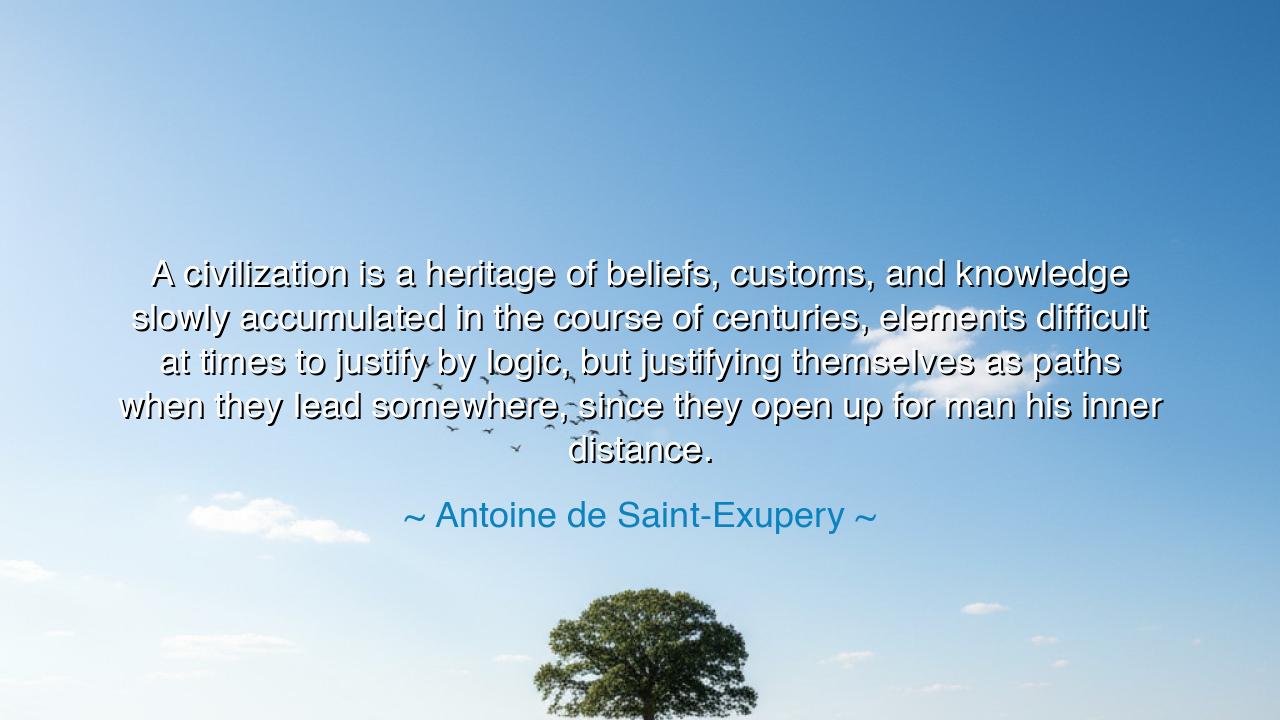
A civilization is a heritage of beliefs, customs, and knowledge
A civilization is a heritage of beliefs, customs, and knowledge slowly accumulated in the course of centuries, elements difficult at times to justify by logic, but justifying themselves as paths when they lead somewhere, since they open up for man his inner distance.






Hear the profound words of Antoine de Saint-Exupéry, aviator, poet, and seer of the human spirit, who declared: “A civilization is a heritage of beliefs, customs, and knowledge slowly accumulated in the course of centuries, elements difficult at times to justify by logic, but justifying themselves as paths when they lead somewhere, since they open up for man his inner distance.” In this reflection, he speaks of the mysterious fabric of human existence, woven not only by reason but also by tradition, faith, and the unseen wisdom of ages. For civilization is not built in a day, nor founded only upon clear logic, but rises slowly through the accumulation of the lived experiences of countless generations.
The sage reminds us that beliefs, customs, and knowledge form the heritage of humanity. Each may seem strange when examined in isolation—an ancient ritual, an inherited story, a custom with no apparent rational ground. Yet, when we look not with impatience but with reverence, we see that these are not accidents. They are the footsteps of those who walked before us, the echoes of their search for meaning. Even when reason struggles to justify them, they have carried peoples across centuries, offering strength, cohesion, and direction. Thus, they are paths, and a path is justified not by its immediate logic, but by its power to lead a traveler onward.
Consider the story of the Roman Republic and Empire. Roman law, religion, and customs were born of centuries of trial and error. Some practices, like augury or ritual sacrifices, may seem irrational to the modern mind. Yet within them lay a unifying power, a sense of order and connection to the divine, which enabled Rome to hold together diverse peoples across vast lands. Their roads, their governance, their customs—these were not purely logical creations, but inheritances refined over time. And from them, later civilizations borrowed much of their foundation.
Saint-Exupéry also speaks of the inner distance. By this, he means the expansion of the human soul, the opening up of our inward horizons. Civilization is not only about cities, armies, and wealth. It is about the shaping of the human heart. When customs, beliefs, and knowledge guide us, they draw us beyond mere survival into reflection, aspiration, and transcendence. They call us to look inward and outward at once, to measure ourselves against eternity. The rituals of ancestors, the stories of heroes, the knowledge of philosophers—all open within man a vast inner sky.
History offers us further proof. The Middle Ages in Europe were filled with practices that modern reason often dismisses as superstition—pilgrimages, chants, relics. Yet these gave structure to life, inspired great cathedrals, fostered universities, and nurtured a sense of belonging that carried societies through centuries of hardship. Logic alone could not have built Notre-Dame, but faith and tradition did. Out of that heritage emerged not only beauty, but the beginnings of modern science and philosophy, showing that what appears irrational may yet open a path to greater truth.
The lesson is clear: do not dismiss too quickly the heritage of your civilization. Question, yes, but with humility. See traditions not merely as burdens of the past, but as gifts that have carried countless souls before you. Ask not only “Is this logical?” but also “Where does this lead?” For, as Saint-Exupéry teaches, the value of a path is not in its justification by reason, but in the horizon it opens to the soul.
So I say unto you: honor your heritage, but walk it with awareness. Study your customs and your beliefs not as chains, but as footsteps laid by ancestors who sought meaning in their own uncertainty. If they lead you to dignity, to unity, to the enlargement of your inner life, then they are justified. And if they do not, let them be refined, for civilization is an ever-living creation, not a dead monument.
Thus his words endure as both guidance and warning: civilization is a heritage of slow accumulation, fragile yet profound, born of more than logic. Cherish it, examine it, and let it lead you into the inner distance, where the true dignity of mankind is revealed.






AAdministratorAdministrator
Welcome, honored guests. Please leave a comment, we will respond soon